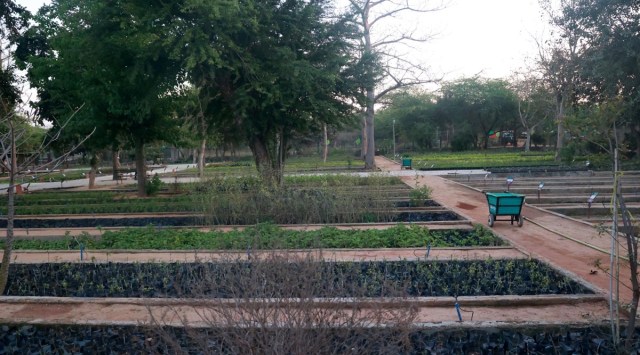At Asola Bhatti sanctuary, a ‘seed bank’ of plants native to the Aravallis
Species that are specific to the Aravallis are identified by studying model sites that have intact forests with very little disturbance, like Mangar Bani in Faridabad. Efforts are then made to replicate these old-growth forests.
 The initiative is a result of a few years of efforts at collecting seeds from across the city and other states. (Express photo by Amit Mehra)
The initiative is a result of a few years of efforts at collecting seeds from across the city and other states. (Express photo by Amit Mehra) A ‘seed bank’, which collects and stores seeds of species of plants that are native to the Aravallis, is gradually taking shape at a nursery at the Asola Bhatti Wildlife Sanctuary, after a few years of efforts at collecting seeds from across the city and other states.
The project, being implemented jointly by the Forest Department and the Bombay Natural History Society (BNHS), began in 2015 with the purpose of providing saplings that are native to the city and bringing back species that are now difficult to find in the city with some having lost out to invasive species like the vilayati kikar which have taken over the Ridge.
Among the additions to the seed bank are seeds of trees like salai (Boswellia serrata) and phalsa (Grewia asiatica) — species that are difficult to find in Delhi, said a source associated with the project, who did not want to be named. These seeds were brought from Rajasthan and Haryana, he added.
“While the nursery itself is growing more than 100 species of native grasses, plants and trees, the seed bank has been developed now. It has just been set up since it takes time to collect these seeds that have been drawn from parts of Delhi, Rajasthan, Madhya Pradesh, Uttar Pradesh, Uttarakhand and Haryana.
For species of conservation concern, we don’t find too many trees in Delhi, like roheda (Tecomella undulata), kulu (Sterculia urens) and bishtendu (Diospyros montana). The idea is to bring back the species that we have lost, create awareness around the trees that are disappearing in Delhi, having these trees available for people to be able to grow them and mapping where they are. A recent addition is grass seeds from Bihar. We needed enough seeds to create a bank. Now we have a surplus and are able to store them,” he said. A team of the Forest Department and the BNHS collects the seeds.
Species that are specific to the Aravallis are identified by studying model sites that have intact forests with very little disturbance, like Mangar Bani in Faridabad. Efforts are then made to replicate these old-growth forests.
The nursery itself provides saplings for plantation by agencies, both government and private, in the city, with around 3.5 lakh saplings produced in this financial year.
Mandeep Mittal, Deputy Conservator of Forests, South division, said, “The plan is to raise production to around 10 lakh saplings every year. There’s a facility now for storage of seeds, though we are not yet in a position to share the seeds with others. The objective is to come to a point where seeds can be shared with other departments or other states. We have had to take assistance from other forest departments as well, for some seeds. This time we got some from Chhattisgarh.”







